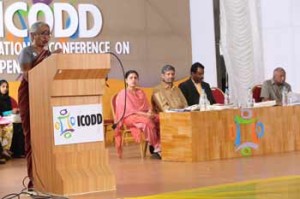 To deepen democracy, it is necessary for people to understand the real meaning of governance, remarked renowned social activist and former National Advisory Council member Aruna Roy. She was chairing the session ‘Transparency and Accountability’, as part of the three-day International Conference on Deepening Democracy organised by Department of Local Self Government, Kerala.
To deepen democracy, it is necessary for people to understand the real meaning of governance, remarked renowned social activist and former National Advisory Council member Aruna Roy. She was chairing the session ‘Transparency and Accountability’, as part of the three-day International Conference on Deepening Democracy organised by Department of Local Self Government, Kerala.
In the 21st century people should acquire power to question government officials for the proper delivery of services. Accountability is the second level of process which accompanies people’s understanding of how government mechanism works. It is inevitable that the Panchayat must work as a team between people and government to put constitutional equality into practice, she said. She said that the growth of Kerala amazed her. In fact the case scenario is very different here. She pointed out that people have been killed for asking information in States like Maharashtra and Rajasthan. This questions the real methodology needed to implement real affective
governance. India is the only country in the world which recognizes the right to work, as evident in the Mahatma Gandhi National Rural Employment Guarantee Act (NGNREGA). Rural Citizens are the steering pillars of democracy. Yet the issue of 60 per cent of people that constitutes rural areas even after six decades of Indian independence remains worse. We have to look at this matter with concern, Aruna Roy concluded. John Samuel, Global Advisor UNDP Governance Centre, Oslo, said accountability was mainly concerned with power relationship. Therefore distribution of power attains supreme stature in delivering justice. It is important that to whom the Government really open? Whether to people or to the multinational companies? Deepening democracy involves a five-stage mechanism, viz. Democratization of Institution, Democratization of knowledge, Democratization of Technology, Democratization of Finance, and Democratization of Power.
Nikhil Dey, well known activist from Rajasthan remarked that many of the democratic debate happened in India have local origins. In fact, RTI could not have been a reality had the people in Rajasthan did not fight for 40 days and nights, toiling their life in danger. It was rather surprising that people in Kerala did not use the help of RTI as a tool in order to deepen democracy into a much wider level, he said. Dr Jithendra G Wasnik, Hemalatha Sarma, Pranjali Dighe, Rebati Naik, Santanu Bhownick, Shainas Aysha, and Sharma D D made presentations.




